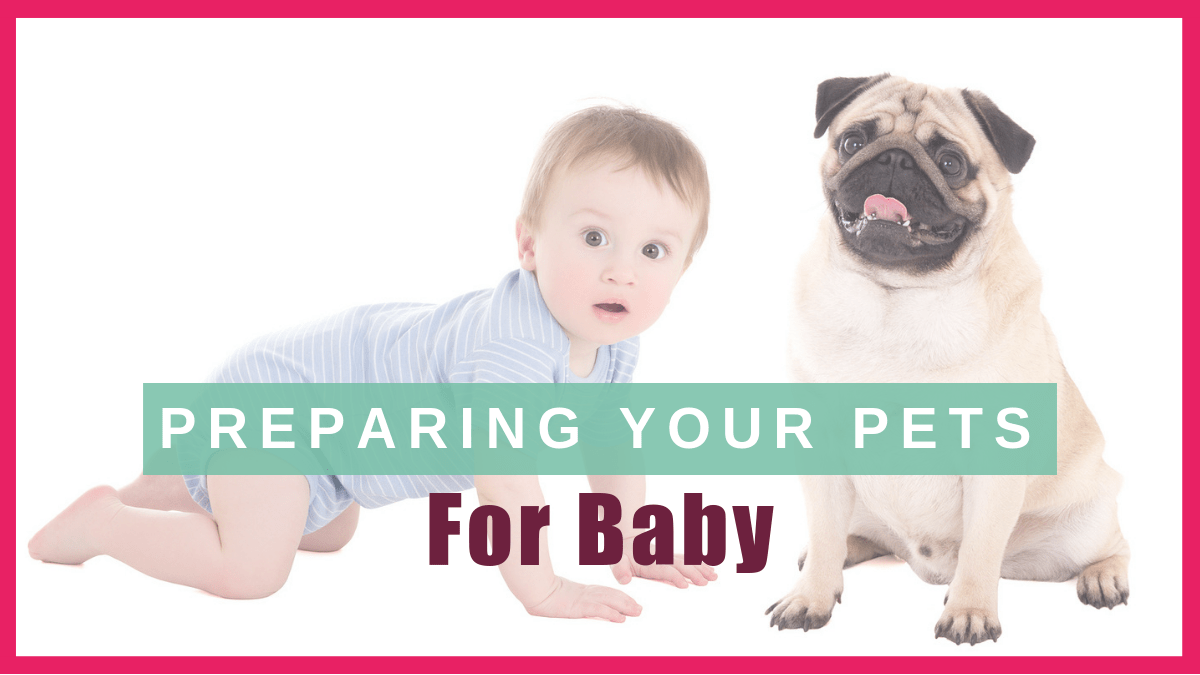When we welcomed my daughter to our family several years ago, I underestimated how hard the transition would be on my pets. They struggled, and I was too preoccupied with a sick child to help them. Soon we will be welcoming another child to our family, and I know how to prepare my pets. I want to share with you what I have learned from my past mistakes as a pet parent and my years as a practicing veterinarian.
1. See your veterinarian
If possible schedule an appointment with your veterinarian two to three months before your new arrival. Consider the following:
- Physical examination – This may uncover problems you don’t see like dental disease or painful areas of your pet’s body.
- Dental cleaning with full mouth x-rays – Most dogs and cats should have this done on a regular basis. For some this is every 6 months and for others in may be every 2 years.
- Bloodwork – Don’t skip this part! If your pet is over 7 years old, this should be done yearly at the minimum.
- Medications – Order a long-term supply of medications if possible. Also, ask your veterinarian if they use an online pharmacy. This way medications can be delivered to your door.
- Stool test – Have your veterinarian test stool samples for your pets to ensure they do not have any intestinal parasites. Some parasites can be transmitted to people.
- Vaccines – Discuss vaccines and titer testing with your veterinarian. If you have opted to not vaccinate your pet in the past, consider vaccinating for Rabies. This disease is 100% fatal to animals and people.
2. Consider your pet’s diet
- Look at delivery services such as www.chewy.com. Having your food delivered can be a huge help. Many companies offer auto ship options, so you don’t even have to think about your next order.
- If you are interested in a home cooked diet, check out Nom Nom Now or The Farmer’s Dog. They deliver balanced home cooked meals for your pup. This is a great option if you want to keep your dog on a home cooked meal but won’t have time to do the cooking. Right now they only provide meals for dogs. Hopefully, meals for cats are coming soon.
- Pet Food Hazards – There are a few things to consider here when mixing pet food and children. Unfortunately, unless you home-cook your dog’s diet, it’s hard to ensure that there is no bacterial contamination of your pet’s diet. This can happen in raw and commercially produced kibble and canned diets. While raw meat may be more predisposed to carry bacterial pathogens like Salmonella and E.coli, kibble formulations are regularly recalled due to bacterial contamination. Most of the time, these bacterial pathogens don’t affect your pet, but can make people, especially young ones, very sick. So what do you do you protect your baby?
If you are feeding a raw diet, understand there is a higher risk of these dangerous bacteria compared with a home cooked diet. If you do decide to feed a raw diet, be sure to sanitize prep areas, hands, and bowls. Pick up bowls directly after meals. Keep your pet’s poop cleaned up regularly. We know that the bacteria found in raw diets are shed live in the stool. If you are feeding a commercially prepared kibble, follow similar sanitary methods. Take up your pet’s food and do not let your child have access to food bowls or pet food. Always wash your hands after handling pet food.
3. Plan for your pet’s mental health
This is where my pets suffered the most. My dog received fewer walks and cuddles, and my cats got booted out of the bedroom at night. This was emotionally and mentally difficult for them. Here are a few things to put in place before your new arrival:
- Find help walking the dog(s) – When there is a new baby in the house, everyone wants to help. Instead of setting up a meal train, schedule people to walk the dog. For dogs, walking is meditation and is one of the best ways to maintain mental health.
- Find help keeping the litter box clean – As you adjust to your new life, it will be easy to get behind in the daily chores. Dirty litter boxes can be very stressful for kitties. It can even cause your kitty to urinate or defecate outside of the box. This is stressful for everyone! Litter boxes are constantly getting an upgrade and you may find that an automatic, self-cleaning litter box could be a game changer for you and your felines.
- Stock up on toys for your pets – Food puzzles are a great way to keep your pet entertained while you find a new rhythm in your house. Nina Ottosson makes fantastic puzzles for your dog or cat.
- Set aside time for cuddling – If your pet likes to cuddle, set up special time every day, even if only for five minutes.
- Make changes gradually when possible – For example, if your pets won’t be able to sleep in your room after the baby arrives, start the transition to their new bed ahead of time.
Adding a new baby or child to your house is exciting and scary and everything in-between.
Preparation can help make the transition a more positive experience for everyone. I would love to hear how you have prepared? How did your pets respond to such a big life change?
Wishing you and your pet health and happiness!



